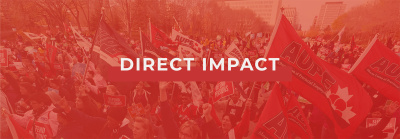Where They Stand
A Pre-Election Report Card
Jan 10, 2019
A Pre-Election Report Card
Within months, Albertans will head to the polls to cast their ballots in the provincial election. Between now and then, Alberta''s political parties and their leaders will jockey for your support as they enter campaign mode, so AUPE decided to cut through the noise and bring you the basics on where each of the major parties stand on the biggest issues facing our province. Read on for the lowdown on how each party''s policies stack up when it comes to public health care, support for public services and protecting pensions.
ON SUPPORTING A PUBLIC HEALTH SYSTEM
ALBERTA PARTY
The party''s shadow budget document proposes to cut nearly $1 billion from health spending in 2019-20. Its policy position on health focuses on cutting funding and doesn''t include any reference to strengthening or supporting public health care. The party says it would develop a strategy focusing on mental health, long-term care and chronic conditions and is in favour of private facilities providing more long-term care.
ALBERTA LIBERAL PARTY
The party calls for a shift in spending that would place more emphasis on mental health and preventative care, the social determinants of health and long-term and continuing care. The Liberals also believe the private sector can play a role in providing long-term and continuing care but not what it deems to be "core" health services, such as lab services.
ALBERTA NEW DEMOCRATIC PARTY
The party at its recent convention took a position to advocate for the creation of a national pharmacare program within our single-payer medicare system, meaning more Canadians would have access to prescription drug coverage, but made no commitment to undertaking that project provincially if the federal government doesn''t take up the call.
The party also voted to legislate safe staffing ratios and minimum staffing levels in the health-care sector, including longterm care facilities.
During recent byelections, candidates reiterated a previous commitment to create new long-term care beds by 2019, but no new beds have been built.
UNITED CONSERVATIVE PARTY
During the party convention in the spring of 2018, the majority of delegates voted in favour of a policy supporting two-tier American-style health care and advocating for privately funded and delivered health care for those who can afford to pay.
The party has also pledged its support for publicly funded, but privately delivered health care and has been critical of government moves to stop the privatization of hospital laundry services.
ON FINANCING PUBLIC SERVICES
ALBERTA PARTY
The party''s shadow budget proposes to cut provincial revenues significantly, by more than $3 billion in 2019-20, and would cut funding by nearly as much - $2.9 billion - in the same period. The party would limit spending in "front-line" ministries only to keep up with population growth but not inflation.
ALBERTA LIBERAL PARTY
The Alberta Liberal policy book includes little discussion on fiscal reforms aside from support for a progressive tax system, but the party has stated that it would weigh the benefits of expanded public services against their potential cost while considering whether taxing or borrowing is the best method to finance those services.
ALBERTA NEW DEMOCRATIC PARTY
During the NDP annual convention, Premier Rachel Notley delivered a speech that focused on her government''s efforts to reduce the provincial deficit and debt, but included but no discussion on how revenues will be bolstered to ensure public services remain strong and protected. By its own projections, the NDP government is not spending to meet population growth and inflation.
UNITED CONSERVATIVE PARTY
The party passed a policy at its convention that pledged to bring back the flat income tax, meaning higher income earners would not be expected to pitch in at a higher rate than low income earners.
The party also voted to bring in a policy that would further reduce the corporate tax rate. Introducing both of these policies would take an estimated $1.5 billion out of the provincial budget, and without corresponding increases to revenues elsewhere in the financial plan, would mean big cuts.
UCP Leader Jason Kenney has said if elected premier, the province would undergo a period of fiscal restraint, including when it comes to public sector salaries. He has publicly stated that he would be willing to cut two per cent of public funding each year, an amount equal to approximately $1.2 billion.
ON PROTECTING PUBLIC SECTOR PENSIONS
ALBERTA PARTY
The party''s MLAs have spoken on the record in the legislature in favour of joint worker-employer governance for public sector pension plans.
ALBERTA LIBERAL PARTY
The party supports joint governance in pension plans. Its official policy states that any reforms to public sector pension plans should be negotiated through the collective bargaining process.
ALBERTA NEW DEMOCRATIC PARTY
The NDP government introduced legislation in the fall 2018 legislature session that proposed joint governance of the Public Sector Pension Plan (PSPP) and the Local Authorities Pension Plan (LAPP). If passed, the legislation will come into force in March 2019. The NDP has also maintained that both public sector pensions remain as defined-benefit plans, rather than defined-contribution plans.
UNITED CONSERVATIVE PARTY
Kenney has stated on the record that he believes "reforming public sector pensions" will be required to deal with what he claims are "huge unfunded liabilities," although both provincial public sector pension plans are healthy.
Kenney has also stated that future public sector pension plans "should avoid unfunded, taxpayer-guaranteed liabilities," phrasing that typically refers to defined-benefit plans. Defined-benefit plans like the PSPP and LAPP offer more security to workers because the post-retirement benefits are pre-determined. With defined contribution plans, workers have a set contribution amount, but no pre-determined benefit amounts to rely on after retirement.
ARE YOU REGISTERED TO VOTE IN THIS YEAR'S PROVINCIAL ELECTION?
Visit elections.ab.ca/voters to add your name to the voters list.
News Category
- Direct impact magazine features
Sector
- Education
- Health care
- Government Services
